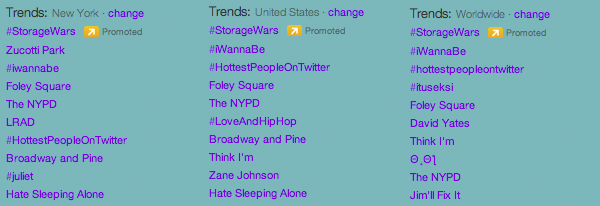
I wrote last month about new research analyzing why #occupywallstreet, despite its trajectory as a political event and despite its seeming prevalence on Twitter, never became a trending topic in the epicenter of the movement: New York. Last night’s occupation of the occupation — the NYPD’s evacuation of Zuccotti Park in lower Manhattan, apparently at the behest of the (public) park’s (private) owners — has changed that…sort of. The Occupy movement trended in the U.S. and (for a brief moment early this morning, Eastern time) globally.
That’s not surprising — the evacuation was and is important news, and it’s being copiously documented on Twitter, by participants and journalists alike — but it offers evidence that would seem to support the theory put forward by SocialFlow‘s Gilad Lotan to explain #occupywallstreet’s trend truancy: that Occupy Wall Street’s steady growth over time, as a movement and as a subject for discussion on Twitter, might have actually hurt its chances to trend. Since trending isn’t just about volume, but also (and apparently more so) about the changing velocity of the usage of a given term or hashtag, Twitter’s algorithm rewards spikes over steadiness. And last night’s raid of Zuccotti — and the flurry of reporting and commentary it occasioned on Twitter — provided a prime opportunity, it seems, for just that type of spike.
However. It’s noteworthy that #occupywallstreet itself, the umbrella tag, still didn’t trend. Nor did #ows, or any of the other broader terms of the movement. Instead, it was specific #ows terms — “Zucotti Park” [misspelled], “The NYPD,” “Foley Square” [the spot where OWSers evacuated to], and “Broadway and Pine” — that trended, along with trendtastic classics like #HottestPeopleOnTwitter, #iwannabe, and (aw) “Hate Sleeping Alone.” Again, further evidence, it seems, that Spikiness is more important than Stickiness when it comes to trending terms.
The bigger question here is whether trending actually matters. And the broad answer is that it doesn’t, much. Occupy Wall Street — though, as a movement, it relies on social media both to spread and to amplify its messages — doesn’t need to trend on Twitter to get the word out. It has other ways to do that. Still, trending topics are pretty much the mother of all hashtags; in that, they’re one-stop-shops for the ideas that matter, across communities, at a specific moment in time. For a movement like Occupy Wall Street — like #occupywallstreet — that kind of convening power matters. And, given some conspiracy theories that have accused Twitter of censoring activist efforts on its platform, it’s worth noting that the latest evidence tracks with what Twitter has been saying all along: that trending topics, more than anything else, “reward discussions that are new to Twitter.”